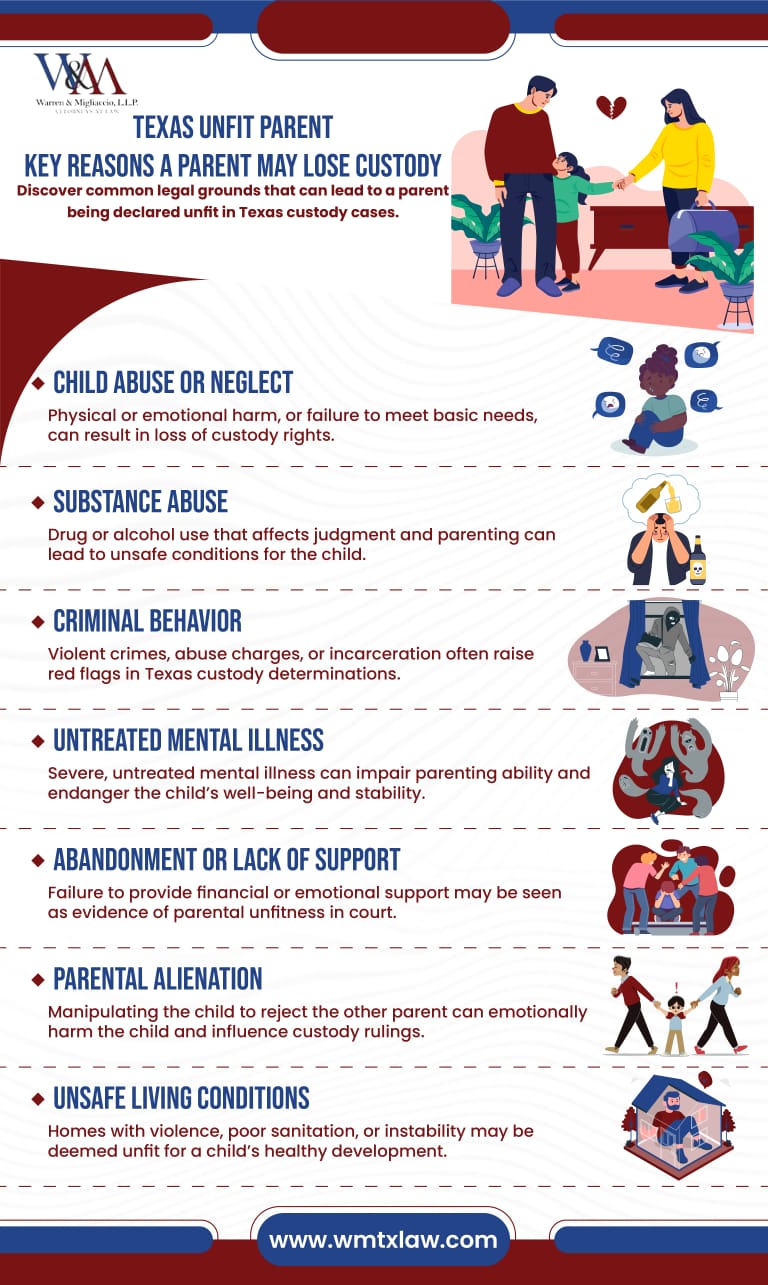Facing a custody battle is stressful—there’s just no way around it. When you think the other parent’s actions might actually harm your child, the anxiety can feel overwhelming.
Concerns about a Texas unfit parent are serious, and they can really shake up child custody arrangements. Parenting time and rights can change drastically if a parent is deemed unfit by the Texas court.
Texas courts always put the child’s best interest first when deciding custody. Sometimes, that means a parent’s rights get limited or changed, which is a big deal for everyone involved.
Understanding what could lead to being labeled “unfit” is crucial for any parent in a custody dispute. You don’t want to go in blind, that’s for sure.
What Does “Unfit Parent” Mean in Texas Law?
If you dig through the Texas Family Code hoping for a clean legal definition of “unfit parent,” you’ll come up empty. The law doesn’t spell it out in black and white.
Instead, Texas law zeroes in on behaviors, conditions, or situations that endanger a child. In other words, it’s less about labels and more about the real-life risks a parent’s actions or environment create.
The big question is whether the parent’s conduct puts the child’s physical health or emotional well-being at risk. Minor parenting differences or small mistakes? Generally, those aren’t enough to raise legal concern.
Rather, concerns have to be substantial—something that could actually harm the child. So, it’s not about nitpicking, but about real danger to the kid.
During custody hearings or trials, judges carefully examine the evidence. Importantly, the parent raising concerns about unfitness has to back it up with proof, not just accusations.
Grounds for Declaring a Texas Unfit Parent
Judges weigh a lot of factors when deciding what makes a parent unfit. It’s rarely just one slip-up; usually, it’s a pattern of behavior.

Here are some of the main reasons Texas courts might decide a parent is unfit, which can have a big impact on custody.
Endangerment of the Child
This is the big one. Endangerment means putting a child in harm’s way—physically or emotionally. It’s a broad term that covers a lot of ground, from child abuse to neglect.
To begin with, physical, sexual, or emotional abuse is clear-cut endangerment. Moreover, allowing someone else to abuse your child? Also a huge red flag.
In these situations, having documentation—such as medical records or counselor reports—matters a lot. Without solid evidence, it’s tough to prove anything.
Furthermore, domestic violence in the home is another major form of endangerment. Even if the child isn’t directly hurt, witnessing violence can seriously affect their emotional well-being.
In addition, if there’s a protective order against a parent, that serves as pretty strong evidence. Likewise, neglect—like failing to provide food, shelter, or medical care—also falls under endangerment. The same applies to not protecting a child from known dangers.
Fortunately, resources like the Texas Department of Family and Protective Services (DFPS) can help you spot signs of abuse or neglect.
Case Study: Endangerment Through Parental Conduct
In In re R.R.A., No. 22-0978 (Tex. 2024), the Texas Supreme Court looked at a father who used meth, was homeless with his kids, had no steady job, and basically abandoned them for half a year. The case highlights the factors considered by courts when determining parental fitness. The trial court ended his parental rights, saying his actions endangered the children.
The Supreme Court agreed that “endangerment” doesn’t require direct harm—just exposing a child to risk or jeopardizing their well-being is enough. So, a mix of substance abuse, instability, and abandonment can absolutely lead to a finding of unfitness.
Protective Orders Carry Powerful Weight
Having a court-issued protective order is one of the strongest forms of evidence for endangerment—judges often view it as a clear signal to limit parenting time.
Texas Child Endangerment by the Numbers
The numbers are sobering. In 2022 alone, 54,207 children in the state of Texas were confirmed victims of maltreatment—that’s abuse and neglect, according to federal stats.
It’s not just the rare, tragic cases. Most often, it’s child neglect: not providing care, supervision, or a safe place to live. These issues pop up in court all the time and are a big part of why unfitness gets decided the way it does.
Identify Key Unfitness Grounds
Select all that apply to your situation:

Substance Abuse Issues
Drug or alcohol abuse is a red flag for parental fitness. In these cases, the court wants to know: does the parent’s substance use interfere with their ability to care for the child?
For example, are they impaired while they’re supposed to be watching the child? Does their substance use result in neglect or unsafe conditions?

Additionally, history plays a big role—arrests for DWI or DUI, failed drug tests, past rehab attempts, and other related incidents are all taken into account. Ultimately, what matters most is how the substance abuse affects the child’s safety and stability. The court also considers whether the parent is actively committed to treatment and recovery.
That said, not all substance use is disqualifying. Occasional, responsible drinking isn’t the same as chronic abuse that puts a child in danger.
If substance abuse is a concern, the court might order drug testing as part of the custody arrangement. It’s about keeping the child safe, not punishing the parent for past mistakes.
A Firsthand Look: Overcoming Substance Abuse in Custody Cases
I once worked with a parent who struggled with alcohol. It was rough—they cared about their kid but sometimes missed pickups or showed up in no shape to help with homework.
The other parent brought it up in court, claiming the child was unsafe. The court evaluated the parent's capacity to manage their substance abuse and provide a stable environment. Before the next hearing, I encouraged my client to get into treatment and stick with support meetings.
Over a few months, they turned it around—stayed sober, showed up on time, and started rebuilding trust. The judge noticed, and my client got more visitation.
It just goes to show, facing substance abuse head-on can really change the outcome in a custody fight. Parents can grow, and that’s something worth remembering.
Criminal Activity or History
A criminal record can weigh heavily in custody cases. Violent crimes, especially those involving injury or family violence, are major concerns for the child's safety.
Crimes against children are taken extremely seriously. Ongoing drug offenses or illegal activity can also create an unstable, unsafe environment for a child.
If a parent is incarcerated, that’s a practical barrier to providing care. But even after release, the type and timing of the crime matter—a single old misdemeanor might not matter, but recent serious offenses probably will.
Recent Violent Crimes Trigger Stricter Limits
While an old misdemeanor may be overlooked, offenses committed within the last few years—especially violent ones—almost always result in tighter custody restrictions.
Mental Health Concerns
Mental health challenges don’t automatically make a parent unfit. Plenty of parents manage conditions and still provide great care.
The question is whether the mental health issue, especially if untreated, actually affects the parent’s ability to keep the child safe or meet their basic needs.
Sometimes, the court will order psychological evaluations. Testimony from doctors or therapists can help clarify things for the judge.
There has to be a clear link between the mental health issue and potential harm to the child. If that’s not there, the court usually doesn’t hold it against the parent.
Groups like NAMI Texas can be a lifeline for parents needing support.
Parental Alienation
Parental alienation is when one parent tries to wreck the child’s emotional environment and relationship with the other parent. This could mean making false accusations, badmouthing the other parent, or blocking court-ordered visits. Parental alienation is when one parent tries to wreck the child’s emotional environment and relationship with the other parent.

It’s damaging—kids deserve a relationship with both parents, and Texas courts know it. Proving alienation takes careful documentation: emails, texts, witness statements, the works.
Courts see this as a sign of poor judgment, and it can lead to a big shift in custody. If a parent is caught alienating, they could lose primary custody.
Related Guide: Custodial Parent Not Following Court Order in Texas: Your Legal Options
Abandonment or Lack of Involvement
If a parent just disappears—no support, no contact for months—they can be found unfit, significantly impacting the child's life. In Texas, abandonment often means no involvement or support for six months or longer.
Skipping visitation or missing important events without a good reason also shows a lack of involvement. Parenting isn’t a part-time gig; kids need consistency.
Abandonment can lead to major changes in custody, and in extreme cases, the court might even terminate parental rights. That’s rare, but it happens.
Unstable or Dangerous Living Environment
Where the child lives matters a lot. If the home is unsafe or lacks a nurturing environment, that’s a problem.
We’re talking about places with no utilities, hazards, or unsanitary conditions. If dangerous people are around, or if the family is constantly moving, that’s a red flag too.
Court wants kids in safe, stable homes. If a parent can’t provide that, their custody rights may be challenged. Photos, videos, or reports from social workers can help prove the state of the home.
Summary of Grounds for Unfitness
Here’s a quick table to make all this easier to digest and understand the impact on the child's welfare:
| Ground for Unfitness | Examples | Primary Concern |
|---|---|---|
| Child Endangerment | Physical, sexual, or emotional abuse; neglect; exposure to domestic violence; failure to protect. | Child’s physical and emotional safety. |
| Substance Abuse | Impaired parenting due to drugs/alcohol; DWI/DUI convictions; failed drug tests; neglect related to substance use. | Child’s safety, welfare, and stability. |
| Criminal Activity | Violent crimes; crimes against children; drug offenses; incarceration; creating an unstable environment. | Child’s safety and stability. |
| Untreated Mental Health Issues | Impaired judgment; inability to provide safe or consistent care; neglecting necessary treatment; psychosis. | Child’s safety, emotional well-being, and consistent care. |
| Parental Alienation | Systematically undermining the other parent; interfering with visits/communication; making false accusations. | Child’s emotional health and relationship with both parents. |
| Abandonment / Lack of Involvement | No contact or financial support (child support) for extended periods; consistently failing to exercise visitation rights. | Parental responsibility and child’s need for involvement. |
| Unsafe / Unstable Living Environment | Unsanitary conditions; lack of utilities; hazards; exposure to dangerous individuals; constant instability. | Child’s physical safety, health, and stability. |
How Do Texas Courts Determine if a Parent is Unfit?
Just accusing a parent of being unfit won’t get you far in a Texas court; you need to present evidence to back up those claims.
Generally, the process is pretty structured: gather evidence, present it according to the rules, and let the judge make the call. During custody hearings, judges listen closely to both parents.
In addition, they hear from witnesses with firsthand knowledge of the family situation. This might include teachers, doctors, counselors, neighbors, or even family friends who’ve observed the dynamics up close.
If there are allegations of abuse or neglect, Child Protective Services (CPS) may become involved. Once CPS steps in, they conduct an investigation, and their findings can become crucial evidence in court.
Moreover, when CPS is involved, it often lends significant weight to concerns about endangerment. Sometimes, courts also bring in independent professionals to assess whether a parent is fit.
Additionally, psychological or child custody evaluations are sometimes ordered—especially in contested custody battles. These evaluations are conducted by neutral mental health professionals who assess the parents’ capabilities, the child’s needs, and overall family dynamics.
Their detailed reports can provide the judge with a much clearer picture. Furthermore, documentation plays a critical role—police reports, medical records, school records, photos, videos, emails, texts, and even social media posts can all serve as relevant evidence.
However, everything must be properly authenticated and submitted in line with Texas court rules. For this reason, it’s often wise to work with a family law attorney who understands the process.
Finally, courts in areas like Harris County or Fort Bend follow these legal procedures closely. At the end of the day, the judge reviews all admissible evidence and makes a custody decision based on the child’s best interests.
Proving a Parent is Unfit: What Evidence is Needed?
You can’t just tell the judge you think the other parent is unfit—you need real proof. The evidence should clearly show an actual risk to the child’s physical or emotional health.
Think about what directly proves the problem. If it’s substance abuse, failed drug tests, DWI convictions, or witnesses who saw the parent impaired around the child are all strong evidence.

If neglect is the concern, maybe you have doctor’s notes or school records showing a pattern of unexplained absences. For parental alienation, keep detailed records of communication.
Save texts, emails, or voicemails that show interference with court-ordered visitation or attempts to turn the child against you. Also, document specific times the parent put the child in unsafe situations or exposed them to inappropriate things or people.
Photos and videos can be persuasive, but use them carefully. Make sure they clearly show what’s wrong—like hazardous living conditions—and that they were obtained legally.
Sometimes, the court will want authenticity established. Official reports matter a lot—CPS investigations, police reports, and protective orders can all carry serious weight.
Testimony from professionals who work with the child—therapists, pediatricians, teachers—can also be powerful. Hearsay usually isn’t allowed, so focus on firsthand accounts and documented proof.
How you organize and present this evidence really matters. That’s why working with an experienced child custody attorney is so important.
Make Sure Your Evidence Is Admissible
Photos, videos, and records must be obtained legally and properly authenticated—otherwise a judge may refuse to consider them.
Consequences of Being Found Unfit in Texas
If a Texas court finds that a parent’s conduct puts a child at risk, the consequences are serious. This finding directly affects child custody and visitation rights, as it prioritizes the child's health and safety.
In such cases, the judge might severely limit the unfit parent’s time with the child. For example, supervised visitation is common—visits happen only with an approved third party present, like a professional supervisor or a neutral family member.
In the most severe cases, if the risk is deemed too high, the court can deny all access—no visitation at all. This usually occurs when there’s clear evidence of severe abuse or immediate danger.
Additionally, sometimes the court goes as far as terminating parental rights. This is the most drastic move—ending the legal relationship entirely. Such a decision only happens in extreme situations, like severe abuse, neglect, or abandonment, as outlined in Chapter 161 of the Texas Family Code.
However, it’s a high bar to clear, and courts generally want to keep parents involved if it’s safe. If one parent is found unfit, the other may be granted sole custody and become the sole managing conservator.
Custody and visitation orders aren’t always final, though. If the unfit parent turns things around, they can ask the court to change the orders.
They’ll need to show there’s been a big positive change, and that it’s now in the child’s best interest. Nothing’s guaranteed, but it’s possible.
The Role of a Family Law Attorney
Going through a custody case—especially with accusations of being unfit—is rough. It’s emotional, and the legal side isn’t simple either.
Having a good family law firm makes a huge difference. An attorney who knows Texas family law can help you gather evidence, follow the rules, and present your case the right way.
They’ll protect your rights, whether you’re making the allegations or defending yourself. Local attorneys in places like Sugar Land, Harris County, or Fort Bend know the ins and outs of those courts.
They handle everything from filings to negotiations to the actual hearing. Many law offices even offer a free consultation so you can talk through your situation before making big decisions.
Custody battles often come up during Texas divorce cases. Therefore, your legal team can also help with property division, child support, and paternity issues if those are on the table.
Can an "Unfit" Parent Change the Situation?
It’s possible for a parent who’s been found unfit—or had their rights restricted—to turn things around, but it’s one of the most challenging times in a parent's life. It takes real effort, real change, and convincing proof for the court.
To begin with, the court wants to see that the parent can provide a safe, stable, and nurturing home going forward. Following all court orders is step one—this might mean co-parenting classes, anger management, substance abuse treatment, or therapy sessions.
That said, it’s not a quick fix. The parent needs to show a long-term pattern of responsible choices and stability, not just a short burst of good behavior.
Moreover, consistently showing up for supervised visits and getting positive feedback helps. Following treatment plans and keeping steady housing and employment also demonstrate to the court that things are truly different now.
In order to change custody orders, the parent has to file a Petition to Modify the Parent-Child Relationship. They’ll need to prove there’s been a real, substantial change since the last order, and that the change is in the best interest of the child.
Ultimately, rebuilding trust with the court, the other parent, and the child takes time and steady effort. The judge will look at all the evidence of improvement before making any changes.
Related: How to Prove You Are a Fit Parent in Texas

Frequently Asked Questions
Definition, Grounds and Outcomes
What legally defines an "unfit parent" in Texas?
There’s no single, clear-cut definition of an in Texas law. Instead, courts look at specific behaviors that put a child’s physical or emotional well-being at risk or show the parent's ability to provide a safe, stable home.
The main focus is always the “best interest of the child,” using the Holley factors—things like the child’s needs, home stability, parental abilities, and any dangers. Courts look for ongoing patterns, not just one-off mistakes or disagreements about parenting styles.
Can the parent provide shelter, food, supervision, and medical care?
Is there evidence the child’s safety or emotional development is at risk?
Simple parenting disagreements aren’t enough for a finding of unfitness.
Judges want to see consistent patterns, not isolated slip-ups.
What are the main grounds for being found unfit in Texas?
The most common grounds involve behavior that puts a child’s safety or well-being in jeopardy. This can include child endangerment, substance abuse, untreated mental health problems, parental alienation, abandonment, criminal activity, or an unsafe home.
Texas courts want to see evidence that these behaviors actually create a real risk for the child.
Endangerment: Physical, sexual, or emotional abuse, neglect, or exposure to domestic violence
Substance abuse: Ongoing drug or alcohol use that affects parenting (like DWI convictions or failed tests)
Mental health: Untreated issues that affect judgment or caregiving
Parental alienation: Deliberately damaging the child’s relationship with the other parent
Abandonment: Leaving the child without support or contact for a long time (often 6+ months)
Criminal activity: Violent crimes, crimes against children, or incarceration that prevents parenting
Unsafe environment: Dirty or dangerous living conditions, lack of utilities, or exposure to unsafe people
What happens if a Texas court finds a parent unfit?
If a Texas court decides a parent’s actions put a child at risk, the court will change the child custody situation to protect that child. The more dangerous the situation, the more drastic the outcome—sometimes it’s just supervised visits, but in really bad cases, it can mean losing all parental rights.
Restricted access: Supervised visitation with a court-approved third party to make sure the child’s safe.
Denial of access: No visitation at all if there’s serious abuse or immediate danger.
Sole managing conservatorship: The other parent gets full custody and decision-making power.
Modified rights: Parental rights may be limited or conditional, depending on compliance with court orders.
Termination of rights: In the worst cases, the legal parent-child relationship can be permanently ended.
Parental Alienation, Endangerment & Recovery
What is parental alienation and how does Texas view it?
is when one parent tries to turn the child involved against the other parent, often through manipulation, false claims, or blocking contact. Texas courts see this as emotional abuse—it damages the child’s well-being and their right to know both parents.
Examples include: Badmouthing the other parent, making up accusations, or stopping visits.
Courts may order: Therapy, changes to custody, or other penalties.
: Texts, emails, witness statements, or patterns of behavior.
Impact on custody: The alienating parent might lose parenting time or, in extreme cases, custody altogether.
What constitutes child endangerment in Texas custody cases?
Child endangerment in Texas (see Texas Penal Code § 22.041) happens when someone knowingly or carelessly puts a child under 15 in real danger of harm. Courts take this seriously, and it can lead to major changes in custody.
Physical examples: Letting kids witness domestic violence, severe neglect, or not protecting them from abuse.
Substance-related: Using or making drugs around a child, or driving drunk with them in the car.
Supervision failures: Leaving young kids alone in risky situations.
Legal consequences: This can mean criminal charges and strict limits on custody.
Evidence standards: The risk must be real and proven, not just a possibility.
Can a parent previously found unfit regain custody rights in Texas?
Yes, it's possible for a parent to get custody or visitation rights back after being found unfit, but it's not easy. They have to show they've made real, lasting changes and that the new arrangement would help the child.
Legal requirement: The parent must prove a "material and substantial change" since the last court order.
Required evidence: Things like finishing court-ordered classes, staying sober, or following treatment plans.
Behavioral demonstration: Showing responsible behavior during visits and other contacts.
Stability factors: Keeping steady housing, a job, and a support network.
Process timeline: It takes time and consistent effort to rebuild trust—there's rarely a quick fix.
Conclusion
Custody battles are never easy—but when the safety and well-being of a child are on the line, the stakes couldn’t be higher. If you believe the other parent may be unfit, or if you're facing allegations yourself, knowing your rights and responsibilities under Texas law is crucial. The courts don’t make these custody decisions lightly, and your ability to present strong, clear evidence can make all the difference.
Whether you're trying to protect your child or defend your role as a parent, don’t go through it alone. The legal process is complex, but help is available.
Our experienced family law attorneys in Dallas, Texas can guide you through the difficult decisions that arise when parental fitness is in question. We’ll help you understand your options, provide you with the legal advice and work toward the best possible outcome for your child. Call our child custody lawyer at (888) 584-9614 or contact us online to schedule a confidential consultation today.

